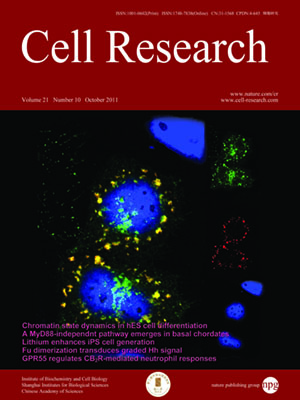
Volume 21, No 10, Oct 2011
ISSN: 1001-0602
EISSN: 1748-7838 2018
impact factor 17.848*
(Clarivate Analytics, 2019)
Volume 21 Issue 10, October 2011: 1424-1435
ORIGINAL ARTICLES
Lithium, an anti-psychotic drug, greatly enhances the generation of induced pluripotent stem cells
Quan Wang1, Xinxiu Xu2, Jun Li3, Jing Liu4, Haifeng Gu1, Ru Zhang2, Jiekai Chen4, Yin Kuang5, Jian Fei5, Cong Jiang6, Ping Wang6,
1State Key Laboratory of Drug Research, the National Center for Drug Screening, Shanghai Institute of Materia Medica, Chinese Academy of Sciences, Shanghai 201203, China
2Shanghai Key Laboratory of Signaling and Disease Research, Laboratory of Receptor-based Bio-medicine, School of Life Sciences and Technology, Tongji University, Shanghai, China
3Department of Chemistry, The Scripps Research Institute, 10550 North Torrey Pines Road, La Jolla, CA 92037, USA
4Key Laboratory of Regenerative Biology, South China Institute for Stem Cell Biology and Regenerative Medicine, Guangzhou Institutes of Biomedicine and Health, Chinese Academy of Sciences, Guangzhou, China
5Shanghai Research Center for Biomodel Organism, Shanghai, China
6Institute of Biomedical Sciences and School of Life Sciences, East China Normal University, Shanghai, China
Correspondence: Xin Xie,(xxie@mail.shcnc.ac.cn)
Somatic cells can be reprogrammed into induced pluripotent stem cells (iPSCs) by defined factors. The low efficiency of reprogramming and genomic integration of oncogenes and viral vectors limited the potential application of iPSCs. Here we report that Lithium (Li), a drug used to treat mood disorders, greatly enhances iPSC generation from both mouse embryonic fibroblast and human umbilical vein endothelial cells. Li facilitates iPSC generation with one (Oct4) or two factors (OS or OK). The effect of Li on promoting reprogramming only partially depends on its major target GSK3�. Unlike other GSK3� inhibitors, Li not only increases the expression of Nanog, but also enhances the transcriptional activity of Nanog. We also found that Li exerts its effect by promoting epigenetic modifications via downregulation of LSD1, a H3K4-specific histone demethylase. Knocking down LSD1 partially mimics Li's effect in enhancing reprogramming. Our results not only provide a straightforward method to improve the iPSC generation efficiency, but also identified a histone demethylase as a critical modulator for somatic cell reprogramming.
Cell Research (2011) 21:1424-1435. doi:10.1038/cr.2011.108; published online 5 July 2011
FULL TEXT | PDF
Browse 2092


